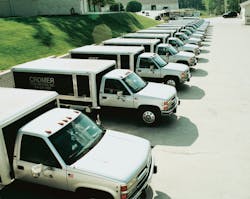Cromer Food Services is not your typical vending company. Located on 40 sprawling acres of South Carolina hills, Cromer Food Services has grown from 6 to 600 customers, 1 to 90 employees and 1 to 26 vending routes in just a little over three decades.
The company earns each contract by building a relationship with the location – it has never bought out another vending company – and by using discipline to drive how it invests in equipment and employees. Cromer Food Services prides itself on being a debt-free company. “We grow with our cash-flow, we don’t borrow any money, that’s one rule that is very important for any vending operator,” said Brent Cromer, president of Cromer Food Services. “This is not the type of business you can serve a debt, so when you get to the point that your startup debt is covered, lean on your cash flow for growth.” Every penny that Cromer Food Services earns, with the exception of employee salaries and wages, is invested back into the company.
From one man to forty acres
C.T Cromer began working in the vending industry in 1954 when he was 14 years old. In 1981 he opened Cromer Food Services that ran out of the back of the family home. “His goal was to have a one man operation and to be able to control the business himself,” said Brent Cromer, C.T’s son and now president of the company.
C.T had an Air Force background and built the company on several disciplines that included constant professionalism and customer loyalty. During the recession in the early 1980s, companies began downsizing, which led their larger vending operators to walk away. C.T saw the recession as a business opportunity, and started servicing these smaller locations. “He had the opportunity to go into some of those smaller companies that needed vending and it was after the recession that those companies started hiring back the employees they had let go. Instead of going back to their larger vending operators, they remained loyal to Cromer because of the loyalty Cromer showed them during the tough times,” said Brent.
The company became second generation in 2004 when the title of company president transferred to Brent, who has maintained the same level of business discipline over the last ten years. Brent had worked for the family business doing odds and ends since he was twelve years old and when he graduated college, he came back to Anderson, SC to work as a route sales person for the business. Running routes taught Brent what areas needed to be improved upon and how the business could be more efficient. And it also taught him how hard route sales personnel work and what type of employee it takes to assume that role.
Investing in the right employee
On the company’s Website it states that there are two things that set one vending company apart from another – equipment and employees. Every route sales person wears a security badge and they have all been screened for criminal records, DMV violations and drug use. Employees can’t have any showing tattoos, piercings that aren’t traditional ear piercings or use tobacco products.
Although gaining employees is sometimes challenging because Cromer Food Services has such strict requirements, the company prides itself on the people it does employ; especially the route sales personnel.
“The route sales people we’ve got are very good. Once we get them hired into the position, they enjoy the work,” said Brent. “But it’s finding the right type of person – that’s the challenge.” The company is continuously looking to hire route salesman, so it conducts interviews each week, even if there isn’t a route open. “We have a team of quality individuals in place, but when we interview someone we think will be a good fit, we will hire them because we don’t want to let them slip away,” he said. “We hire on personality first. We can teach someone how to run a route, but we can’t teach someone to have a good personality.” Potential route sales people go through several interviews to make sure they understand the nature of their work. Then, if they are hired, they are trained for thirty days on a route before going out on their own.
Self-sustained = more reliable
Not only does Cromer Food Services invest in its employees, but it also invests in its equipment. The company began prekitting in 2009, which helped it increase profits on every route. Prekitting led Cromer Food Services to re-think how it uses vehicles and what types of vehicles it uses. The use of prekitting took the average route from a $7,000 per week sales average to a $13,000 per week sales average. Prekitting took the company from using many smaller trucks to using fewer larger trucks.
“Once we started prekitting, we’ve had to re-develop our trucks,” said Brent. Cromer Food Services recently ordered eight new Omnivan trucks from Equipment Innovators with a full body unit refrigeration system. Now the company has a refrigeration compartment for the food and another refrigerated compartment for all other products. “The Omnibody has made us more efficient because it eliminates the center-aisle and the route driver doesn’t have to step into the box truck, which eliminates many safety hazards and extra steps,” said Brent. The new trucks will be cooled at a temperature below seventy degrees Fahrenheit so products like candy and pastries can be placed in the back year-round. The company has also started looking into temperature gauges to monitor internal truck temperature wirelessly throughout the day.
Just like everything else, trucks are a business investment for Cromer Food Services, so the vehicles are handled with care and maintained to strict professional standards. The management staff uses GPS Tracking and Verizon Wireless to monitor a truck’s fuel mileage, oil levels, tire pressures and handling statistics to ensure route drivers are being cautious and safe drivers.
The company even employs two full-time vehicle technicians to work on its fleet of 50 trucks. The employees do all in-house vehicle repairs, including engine, tire and some bodywork — everything except for radiator repairs and front-end alignment.
All trucks that have been on the road during the day are required to be sent through the company’s wash bay when they come in in the evening. “People like to eat out of clean environments, not dirty trucks,” said Brent. Additionally, each truck is taken through a safety check for brake lights, fluid levels and tire pressure each evening before drivers head out the next day.
The automotive care comes from C.T who is, as Brent describes, a very automotive-savvy person. “He knew what the wear and tear does to vehicles when he started the company. That’s why we have strict rules for our vehicles,” said Brent. “A truck is a big investment for any vending company so why wouldn’t you want to take care of your investment?”
Cromer Food Services places such an emphasis on customer service and loyalty that if a truck breaks down in the middle of a route, the company will send its own roll-back truck out to the site with a replacement truck so the driver just simply has to transfer product and continue to the next location. That way, a customer never feels forgotten.
Micro markets: The future of Cromer
The company has been able to stay one step ahead by making smart investment decisions along the way. These decisions not only encompass investments in employees and equipment such as trucks, but also in the company’s business enterprises.
In 2013, Cromer Food Services opened its first micro market with Breakroom Provisions and now operates ten markets, making up 2 routes. “Micro markets are the future of our business,” said Brent. The company is opening one new market each month and always looking to hire and train employees specifically to run route on micro markets.
Although he sees at least a 25 percent increase in food sales over vending, Brent also has seen the other side of micro markets. “Theft is an issue that we have to get a hold of,” he said. “Anybody who says they aren’t experiencing micro market employee theft or is reporting it as low as 1 percent isn’t looking at the numbers close enough.” He says that the key to keeping it under control is catching someone in the beginning when the market first opens and then monitoring video feeds once a month or once a quarter. The company’s most profitable part of its business, however, is its OCS segment.
In the late 1990s, Cromer Food Services added OCS to its business model because as margins got lower in the cold beverage segment, the company needed to look into other areas of revenue. They began to see the profitability of office coffee service in the early 2000s and decided to put as many resources as possible into that part of their business. It has even invested in technology on the OCS side so locations can more easily order product. “We wanted to separate the coffee and vending on all aspects, and that included the software as well,” said Brent.
Cromer Food Services uses a Midwest roaster, White Bear Coffee, that has helped the company change the image of its OCS offerings. “They helped us to develop a better vending coffee, where in the past a cup of coffee from a vending machine wasn’t viewed as a positive,” said Brent. Much like micro markets, he sees OCS as a large driver in the company’s future success. “OCS is expanding everyday. We are putting more and more money behind it and it’s been an area of expansion within the last three to five years,” he said. “OCS isn’t as price sensitive. In OCS you can get the same profit with less investment, unlike vending,” said Brent.
Challenges come and go
With all the success the company has experienced in the last three decades, it has also experienced some challenges. In the early 2000s, finding labor was an issue. And these days, Brent says the biggest challenge is controlling food costs. “Food costs are going up and consumers don’t understand why the price on the vending machine is changing. And that’s something we have to end up explaining.” However, even with challenges that come and go, the company is confident that the investments it makes now will ensure its future of success.
Sidebar 1:
Cromer Wins First Runner-Up Verizon Wireless Technology Innovation Award
In 2013, Verizon Wireless was looking for nominations for an award to go to businesses in the Southwest who had used Verizon services to become more efficient, and Brent Cromer knew that Cromer Food Services was a perfect candidate. Cromer Food Services equips its field employees with handheld computers to help manage inventory. Those inventory counts are sent via Verizon Wireless’s 4G LTE network.
Leading up to the award, Cromer Food Services began partnered with USA Technologies to install card readers on many existing machines. The company initiated a partnership with Verizon and USA Technologies to place card readers on high-volume machines and has seen higher sales and larger growth.
The company was named the 2013 Verizon Wireless Technology Innovation Awards runner-up and was awarded a $5,000 prize.
Profile: Cromer Food Services
Headquarters: Anderson, SC
Number of employees: 90
Number of routes: 27
Software provider: VendSys
Micro market provider: Breakroom Provisions
Annual sales: Not Available
About the Author

Adrienne Klein
Contributing Editor
Adrienne Zimmer Klein is a freelance writer with a background in the vending, micro market and office coffee service industry. She worked as an associate editor and managing editor at Automatic Merchandiser and VendingMarketWatch.com from 2013 until 2017. She is a regular contributing writer at Automatic Merchandiser.
